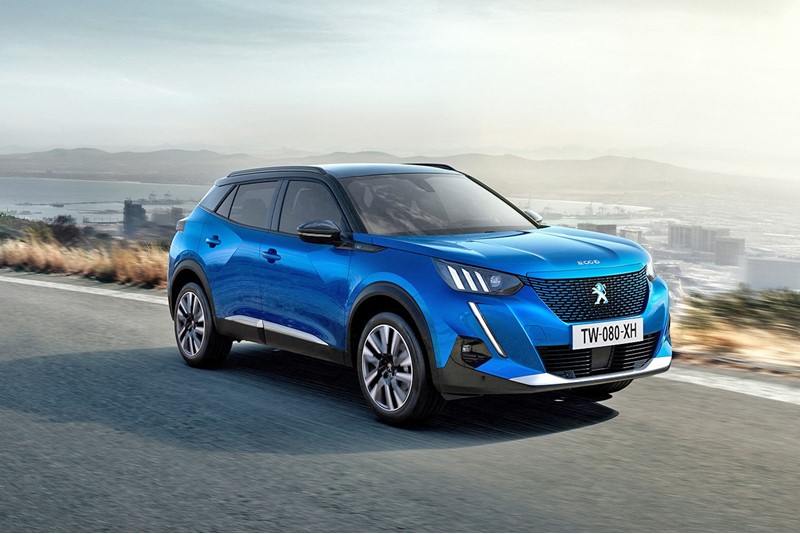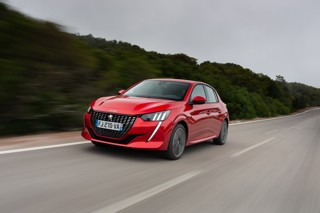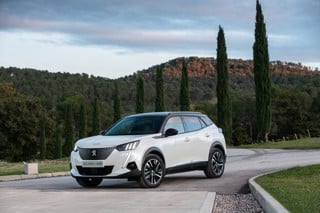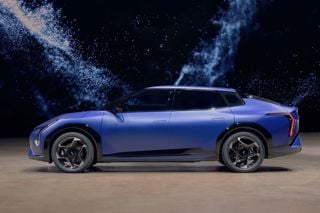There are two schools of thought about the impact of the Covid-19 pandemic on company car drivers.
One is that increased home working, fewer face-to-face meetings and reduced mileages will lead to more drivers opting out of company car schemes (or possibly having the benefit removed if mileage no longer warrants a car).
The second is that the reverse will happen – drivers who have previously opted out of company cars will be tempted back into schemes, perhaps to avoid public transport and, thanks to a wider choice of hybrid and pure electric cars, with low or zero benefit-in-kind (BIK) this tax year – an acceleration of a trend that was happening pre-Covid-19.
Martin Gurney, Groupe PSA director – fleet and used vehicles, who is responsible for fleet sales for Peugeot, Citroën and DS in the UK (Vauxhall is managed separately), subscribes to the latter view.
“What I’ve tended to see, with new electric vehicles (EVs) joining our range – we’ve got the Peugeot e-208, e-2008, the DS 3 Crossback E-Tense, and the new Citroën e-C4 just around the corner – it’s quite clear that the BIK rates on EVs are driving a trend the other way.
“A number of leasing companies have said to me that they’re seeing people who have opted out of car schemes, and therefore become part of the grey fleet, viewing EVs as a really attractive company car or salary sacrifice option.”
He acknowledges that demand for used cars has been “really robust” recently but puts that down to people seeking an alternative to public transport for their daily commute rather than company car drivers switching to used cars.
Gurney expects fleet to account for a third-to-half of sales of PSA’s new electric cars, with e-C4 sales being closer to 50% and e-208 being about a third. However, he stresses that “we’re not constrained by that” as PSA does not allocate vehicle supply on a retail/fleet basis, instead preferring a first-come, first-served approach.
Demand from leasing companies, salary sacrifice schemes and public sector fleets has meant that fleet is getting “its fair share” of EVs, according to Gurney.
“We’re also seeing emerging EV subscription service providers following close behind in terms of demand,” he says. “Corporate orders are starting to build as well. We do have some stock available of our battery electric vehicles (BEVs) but certain models we’re starting to see lead times push toward the back of the year and into 2021.”
He adds that, in general, PSA keeps a “core definition” i.e. the vehicles that make up 80% of its sales in stock.
“What we’re finding is that the production we lost during the shutdown has been balanced by the lower demand we saw in April and May,” he says.
“I don’t see any abnormal issues from the perspective of current or expected lead times.
“If you wanted to place an order for an e-208 tomorrow, provided you weren’t asking for something outlandish, then you would find it in stock.”
Along with new electric cars, PSA is gearing up for demand for its electric light commercial vehicles with order books open for the Peugeot e-Expert and Citroën e-Dispatch, and Citroën e-SpaceTourer and Peugeot e-Traveller passenger van, followed next year by the Citroën e-Relay and Peugeot e-Boxer (shown at the 2019 Commercial Vehicle Show), and the e-Berlingo and e-Partner.
A new dealer training and support programme on vans, covering product knowledge/specification, LCV terminology, LCV financing options, the UK LCV market, taxation and LCV customer consultation to ensure suitability for user needs, has been introduced to non-Business Centre dealers, while specific training on electric vans has been introduced to all dealers.

Fleet News: Now we’ve passed the halfway point for fleet sales, how much of a recovery are you experiencing?
Martin Gurney: Year-to-date our true fleet car share is up for Peugeot (3.39%, from 3.2%) and DS (0.26%, from 0.18%) at the end of July, whereas we’ve seen a planned decline for Citroën. This is a result of the implementation of our channel mix improvement and residual value protection strategy which we started work on and started delivery on slightly sooner in the Peugeot franchise as we had new models coming along. We’re now applying that to Citroën as well. What that means is that we’re moving away from shorter cycle, high churn business, which is potentially damaging for residual values and focusing on the better quality business.
On the flip side, Motability share has grown for all three brands (Peugeot 5.46%, up from 5.11%, Citroën 3.48%, up from 3.37% and DS 0.2%, up from 0.14%). Year-to-date, true fleet LCV share is up for both Peugeot (11.7%, from 10.72%) and Citroën (10.53%, from 9.99%).
FN: Last time we spoke, 65% of the fleet team had been furloughed, what’s the situation now?
MG: We furloughed staff in waves so we furloughed some of the back office and field team early April and then some more mid-April. But we were careful to make sure we retained sufficient cover for all our customer requirements at all times through that process. Since the beginning of June, though, 100% of the customer-facing team are back at work but, obviously, still working virtually. And we’ve been bringing back the remaining HQ support staff progressively, as demand dictates. We’ve had the full team, including all the back office support teams back since the beginning of August, albeit they are home working. It’s the group’s stated intention to adopt a home-working culture with a target of spending, on average, probably a day to a day-and-a-half a week in the office. So, as we move forward, homeworking is going to become our norm with the office facility that we’ve got in Coventry being used more for big team meetings, collaborative sessions and all those parts of working together as a team, which, of course, are important.
FN: What else is being done virtually?
MG: We’ve been carrying out customer meetings either by tele- or video-conference. We did quite a bit of virtual meeting training fairly early on in the process to make sure we’re handling those virtual meetings in the best possible way. We also intend to make greater use of our virtual showroom concept. That started off primarily as a retail initiative. But, what we’re trialling at the moment is actually giving our fleet customers the opportunity to dial into that facility. So, if we have a fleet customer that wants to see a particular vehicle first-hand, and perhaps we can’t get a fleet demo to them for a week or two, they’ll be able to make use of that facility which, obviously, will bring some additional colour to that virtual relationship.
FN: Will customer meetings continue to be virtual?
MG: We’re not back out seeing customers at the minute, except for where customers specifically request our presence for something. But we are absolutely determined to maintain a face-to-face presence, certainly for first meetings and for important tender presentations.
However, we do think that a lot of those normal account reviews, which might take place every two or three months, can take place remotely.
And I think there are several benefits to that: it will save our fleet team a lot of dead travel time and it will mean we’re much more accessible and available to respond to customer requests. That said, we’re very customer-led in our approach, and if we have customers that still want to see us face-to-face all the time that’s what we’ll do.
FN: How many of your fleet customers have chosen to extend contracts or delay purchases?
MG: There’s no simple answer to that. If I look at our fleet order books for all three brands they remain really strong and well above last year’s levels. You might say that’s understandable, given we’ve had a period of two-to-three months where we’ve not delivered many vehicles. But we’re not seeing huge waves of cancellations. Instead, we’re seeing this backlog of Q2 orders still to be delivered.
We’re taking a really flexible and pragmatic approach with our customers. We’re looking customer-by-customer at the situation they’re in, working in partnership with them, and of course, their supplying dealers to ensure we can supply the vehicles that they’ve got on order as soon as they’re required.
And I would say, more generally, we’re seeing as many customers perhaps extending contracts or diverting business to flexi-rent as we are seeing customers coming the other way – coming out of flexi-rent agreements and deciding that now’s the right time to buy a vehicle. So it really does vary. I don’t have a single number to say ‘this many customers have chosen to extend or delay’ because that’s not the norm.
FN: Do you see flexi-rent as a growth area?
MG: Yes, I do. I suspect, as we move through the rest of the year, we’ll probably see flexi-rent demand up 5-10%. Some customers are demanding a lot more, some are demanding less. But, certainly, I expect that positive trend to be inflated, at least through until Christmas.
FN: What are your expectations for public sector fleet sales?
MG: Public sector is going to be helped enormously by our electric vehicle offering. Our order books are very strong for the public sector, we are something like 85% up on this point last year and a significant proportion of that growth is driven by orders for EV. We’re also finding there’s a lot more resilience in the public sector space than might otherwise be the case in the corporate world. So, for example, where we saw no change at all in the pattern of our deliveries throughout the lockdown was in supplying vehicles to police forces.
FN: What are your expectations for C4?
MG: It’s going to give me and my team a completely new string to our bow in having a full battery-electric C segment hatch. It really does stand out and I think there’s going to be an awful lot of fleet interest in that car. It will have a 100kW electric motor, really high torque, the ability to quick charge 80% in 30 minutes, 200-mile-plus WLTP range and an eight-year factory warranty or 100,000 miles. It’s going to be complementary to what we’re already seeing with huge success and demand for e-208, e-2008 and DS 3 E-Tense. It’s an amazing opportunity for 2021 for Citroën.
FN: Is PSA still on track to meet the Clean Air for Europe (CAFE) CO2 emissions targets?
MG: Absolutely. DS Automobiles has achieved average fleet CO2 emissions of just 79.9g/km for the first half of 2020, the only multi-energy premium brand to meet the current 95g/km CO2 target. There is no way the group is going to pay to pollute. Our assumption is that post-Brexit, CO2 targets will be more stringent, not less, than the ones currently in place or set by the European Commission and we’re ready to deal with those if that arises.
Gurney views the outcome of the Brexit transition period, the recovery from the current pandemic and ensuring the country is not hit by a ‘second wave’ as key challenges for the remainder of the year.
In light of these, he says it is “critical that we’ve got certainty of what the Government’s support packages will be in place for our sector”.
However, he remains positive about the future, including that of the mobility market for PSA’s Free2Move, with the launch of a new online rental platform and app called Free2Move Rent, which replaces the Peugeot car and van rental programme with a wider, multi-brand (Peugeot, Citroën, DS and Vauxhall) dealer-based rental solution.
A new car subscription service, Car on Demand, is in the offing, following a successful 12-month trial in France.
While not able to confirm any details, Gurney says: “The ambition (for Free2Move) remains to offer a range of solutions for fleet and retail customers that are either complementary or substitutional to traditional car ownership.”
Even car sharing will recover and is “here to stay”, in Gurney’s view.
Also on the horizon is the PSA-FCA merger, which will create a new manufacturer super group, named Stellantis, next year, subject to the necessary approvals and the satisfaction of antitrust and other regulatory requirements.
It is an interesting proposition for fleets but Gurney was unable to comment on the implications until the merger is confirmed.
Winning two Fleet News Awards means…
“I am delighted with the success, on both fronts. The previous 208 was a Fleet News Award winner and it’s great to have that accolade behind it, it can do nothing but help us as we present a new model to the fleet industry,” says Martin Gurney.
“As a spin-off from that, with the new 2008 in that huge D segment, it’s fantastic to have that car as a winner at the same time.
“I’m absolutely delighted that the Fleet News Awards judges selected them as the best in their segments.”
Judges' comments
Best small car: The new 208 is a complete transformation from the old car with significant improvements in looks and the quality of the interior fit and finish. It is packed with clever technology and has low running costs and CO2 emissions.
Best compact SUV: Offering a size that will meet the needs of most drivers, the new 2008 has fresh, modern and distinctive styling with a high-quality interior that elevates the brand to even higher levels. The electric version further transforms the model range. Peugeot has taken a good car and made it excellent.





















Login to comment
Comments
No comments have been made yet.